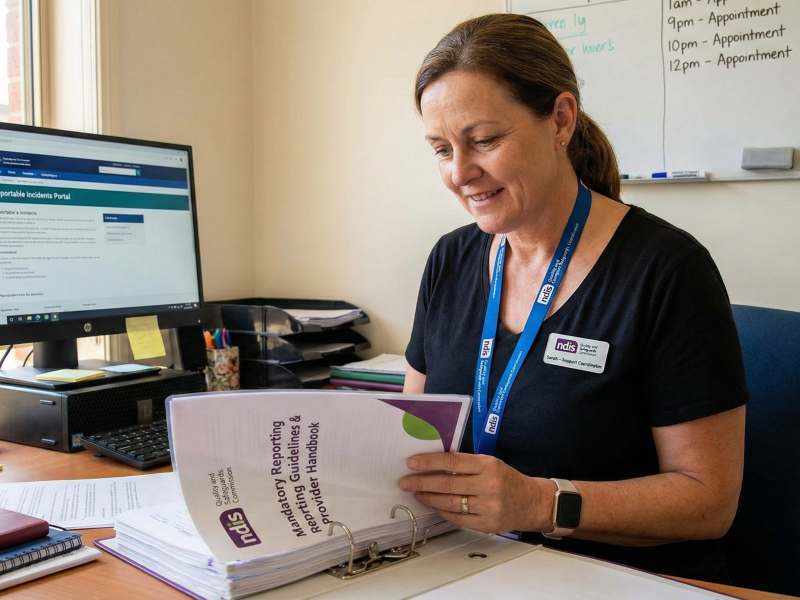The National Disability Insurance Scheme (NDIS), launched by the Australian Government in 2013, represents a major shift in the way disability support is delivered across the country. The NDIS provides funding to NDIS Participants, specifically funding supports and services related to their disability. The NDIS program marks a significant shift in how disability support is delivered in Australia.
The goal of the NDIS is to empower people with permanent and significant disabilities by giving them greater choice and control over the supports they receive. These NDIS-funded services are designed not only to assist with daily living but also to enhance independence, participation in the community, and overall quality of life.
Alongside supporting Participants; the NDIS also plays a key role in the broader community. By connecting Participants with Registered NDIS Providers, the scheme aims to strengthen community inclusion, support economic participation, and improve access to high-quality services and core supports.
What is an NDIS Provider?
An NDIS Provider is a business that delivers NDIS-funded supports and services to NDIS Participants, helping them work toward their goals and improve their daily lives. These supports are paid for through NDIS funding, easing the financial pressure on Participants and ensuring access to the disability-related supports and services they need.
NDIS Providers can operate under a range of business structures, such as sole traders, companies, or not-for-profit organisations like charities. Regardless of their structure, all Providers play a vital role in delivering safe, high-quality services that align with each Participant’s Plan.
Provider Obligations
The NDIS Practice Standards are set and regulated by the NDIS Quality and Safeguards Commission, which oversees compliance for all Registered Providers delivering NDIS supports. These standards require that services are person-centred—designed around the unique goals, needs, and preferences of each NDIS Participant—while promoting respect, professionalism, and a commitment to continuous improvement.
To deliver safe, high-quality services, NDIS Providers must meet several key obligations. These include:
- maintaining current and appropriate business insurances,
- ensuring all workers have completed an NDIS Worker Screening Check, and
- confirming that staff are suitably qualified, trained, and competent for the supports they deliver to NDIS Participants.
While Unregistered Providers are not subject to formal audits, they are still required to comply with the NDIS Code of Conduct, and must uphold the rights, safety, and wellbeing of NDIS Participants during all aspects of service delivery.
Benefits of Becoming A Registered NDIS Provider
NDIS Registered Providers are considered the gold standard within the NDIS service industry. This is due to their investment in ongoing compliance with all registration requirements established by the NDIS Commission, to ensure high-quality supports and services are delivered to NDIS Participants.
Registered Providers are required to undergo a rigorous Application and Auditing process to achieve initial accreditation. Once initially Registered, many Providers are also subject to often complex (and costly!) additional audits throughout their 3-year Registration Cycle. This ongoing auditing process ensures that only the best and most appropriate Providers are Registered with the NDIS to provide supports and services to NDIS Participants.
Becoming a Registered Provider not only enhances credibility but also fosters trust among Participants and their families. It demonstrates the Provider’s commitment to supporting individuals under the NDIS; through their demonstrated investment in the business’ ongoing Registered Provider accreditation.
Benefits
Registered NDIS Providers benefit from:
– Free advertisements on the NDIS website upon registration via NDIS Provider Finder tool
- Increased business opportunities
- Recognition as trustworthy and capable of providing high-quality disability services
- Opportunities to work directly with NDIA-managed Participants
- Fast payments through the NDIS portal
- Ongoing support and resources from the NDIS
- Options to offer a variety of products and services across different support categories
In contrast, Unregistered Providers do not complete the Registration process and, therefore, do not enjoy the same benefits and business opportunities. As a result, they may need to work harder to earn community trust and credibility.
Interested in NDIS Provider Registration? Avaana is the industry leader, proudly assisting businesses seek and maintain NDIS Provider Registration Accreditation.
How to become Registered?
Businesses wanting to become Registered need to undertake the NDIS Registration Application process. The Registration process is outlined below:
- Determine Eligibility – Your business service offerings should sit within the NDIS framework.
- Complete the Online Application – Fill out an online application.
- Conduct an Audit – An independent audit by Registered Providers shall evaluate compliance against NDIS Practice Standards.
- Approval – Upon acceptance of the application, NDIA awards official registration so that the Provider can supply services to NDIA-funded Participants.
- List Service on the NDIS Portal – Providers can market their services by listing them in the NDIS Portal, from where Participants could more easily spot and hire them.
Key Responsibilities of an NDIS Provider
NDIS Providers have an important role to play in assisting Participants by providing quality services that are in line with their objectives. Some of the main responsibilities are:
- Adhering to the NDIS Code of Conduct and Practice Standards.
- Ensuring safe, ethical, and Participant-focused services.
- Practising open communication and adequate documentation.
- Providing services that enhance Participant independence and well-being.
- Improving service quality through feedback and training.
- Being financially accountable when managing Participant funding.
Who do NDIS Providers work with?
NDIS Providers work with a diverse range of Participants, which includes young children as well as older adults. They serve individuals with various disabilities, including:
- Physical disabilities
- Intellectual disabilities
- Sensory disabilities
- Neurological disabilities
- Psychosocial disabilities
These Providers assist with everyday activities and personal care in the Participant’s home. They also offer complex medical care in residential facilities or within the community. As a result, NDIS Providers must be adaptable, culturally aware, and responsive to the needs of their clients.
To deliver effective support, NDIS Providers often collaborate with various stakeholders, such as healthcare professionals, educators, and community organisations. For example, a Provider may work with a child diagnosed with autism. They might collaborate with the child’s speech therapist and teacher, which can significantly enhance the child’s independence and overall well-being.
Strong communication skills are essential for this collaboration and coordination process. These skills help ensure that:
- The needs and preferences of everyone involved are understood and respected
- Trust is built between all parties
- Misunderstandings are minimised
- Consistency in care is maintained.
How to Choose the Right NDIS Provider?
It is important to choose the correct NDIS Provider so that Participants can access optimal support for their needs. Important considerations are:
- Accreditation and Experience – Make sure the Provider has adequate experience and NDIS quality standards.
- Range of Services – Confirm whether the Provider provides services in accordance with the Participant’s NDIS support Plan.
- Reputation and Reviews – Seek feedback from other NDIS Participants and carers.
- Communication and Support – A quality Provider must place premium importance on clear communication and a Participant-centric attitude.
- Flexibility and Personalization – Services must be flexible to accommodate personal preferences and needs.
What is an NDIS Support Plan?
An NDIS Plan is an individualised document created for each NDIS Participant that outlines their goals, disability-related support needs, and the types of funded supports they will receive through the NDIS. The NDIS Plan is designed to ensure that the Participant receives the right supports to help them pursue their goals, increase independence, and participate more fully in everyday life.
The planning process is collaborative and places the Participant at the centre of decision-making. It may also involve input from their:
- Family members
- Carers
- Community network
- Support Coordinator
Creating an NDIS Plan involves several key steps to ensure that supports are tailored to the individual needs and goals of the Participant:
- Identifying the Participant’s goals, such as increasing independence, learning new skills, or engaging in the community
- Assessing the Participant’s disability-related support needs, including assistance with daily activities, mobility, or therapy
- Determining how resources will be allocated, including the type and level of funding, plan management option, preferred Providers, and expected timeframes
- Reviewing the Plan regularly—typically every 12 months—to ensure it continues to align with the Participant’s evolving needs and goals
Each NDIS Plan directly influences the kinds of supports and services a Participant can access.
NDIS Plan Types
There are three ways that NDIS Participants’ Plans are managed, including self-managed, Plan-managed and NDIA-managed. Self-managed and Plan-managed Participants may only use Registered NDIS Providers for the following:
- Specialist Disability Accommodation (SDA) supports
- Supports or services related to a regulated restrictive practice
- Behaviour supports
- Support Coordination
Self-managed Plan:
Participants who choose this option manage their own funding, meaning they are responsible for selecting and paying their support Providers. They can use both Registered and Unregistered Providers for most services.
Plan-managed Plan:
In this case, Participants have a Plan Manager who collaborates with them to manage funding. Plan-managed Participants can access both Unregistered and Registered Providers for most service types.
NDIA-managed Plan:
Under an NDIA-managed Plan, all Participant activities are overseen by the National Disability Insurance Agency (NDIA). This option is the most limiting, as it only permits the use of Registered Providers. However, in some cases, having the NDIA fully manage a Participant’s Plan is necessary.
Conclusion
Becoming an NDIS Provider is a fulfilling chance to give back to the disability sector while launching a viable business. Regardless of whether NDIS Registration is required, Providers have a vital role in enhancing the quality of Participants’ lives and the needs of their community. With an increased need for NDIS supports in Australia, becoming a Registered NDIS Provider can be a valuable business consideration.
FAQs
What does an NDIS Provider do?
An NDIS Provider delivers services and support to NDIS Participants to enable them to reach their goals and enhance their quality of life. Providers can provide personal care, therapy, transport, and employment support.
How do NDIS Providers get paid?
NDIS Providers are paid according to the services they provide. Registered Providers can directly claim payments from the NDIS portal, while Participants or Plan managers pay Unregistered Providers.
How to start your own NDIS business?
To begin an NDIS business, determine the services you wish to provide, register or comply with the required steps, go through any required audits, and promote your services to NDIS Participants.
How Much Does It Cost To Be An NDIS Provider?
Fees differ based on the services provided and whether or not registration is necessary. Fees can include application fees, audit fees, insurance, and recurring compliance costs.
How do you choose the right NDIS Provider?
The right NDIS Provider is chosen by assessing their experience, services, accreditation, flexibility, and client reviews to determine if they can effectively address individual Participant needs.


